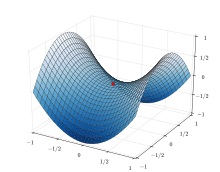
Back মিনিমেক্স উপপাদ্য Assamese Min-Max-Theorem German Théorème du minimax de von Neumann French משפט המינימקס HE Teorema del minimax Italian Теорема Неймана — Моргенштерна о минимаксе Russian Minimax-teorem Swedish 最小最大值定理 Chinese
In the mathematical area of game theory, a minimax theorem is a theorem providing conditions that guarantee that the max–min inequality is also an equality. The first theorem in this sense is von Neumann's minimax theorem about zero-sum games published in 1928,[1] which was considered the starting point of game theory. Von Neumann is quoted as saying "As far as I can see, there could be no theory of games ... without that theorem ... I thought there was nothing worth publishing until the Minimax Theorem was proved".[2]
Since then, several generalizations and alternative versions of von Neumann's original theorem have appeared in the literature.[3][4]

Formally, von Neumann's minimax theorem states:
Let and be compact convex sets. If is a continuous function that is concave-convex, i.e.
Then we have that
- ^ Von Neumann, J. (1928). "Zur Theorie der Gesellschaftsspiele". Math. Ann. 100: 295–320. doi:10.1007/BF01448847. S2CID 122961988.
- ^ John L Casti (1996). Five golden rules: great theories of 20th-century mathematics – and why they matter. New York: Wiley-Interscience. p. 19. ISBN 978-0-471-00261-1.
- ^ Du, Ding-Zhu; Pardalos, Panos M., eds. (1995). Minimax and Applications. Boston, MA: Springer US. ISBN 9781461335573.
- ^ Brandt, Felix; Brill, Markus; Suksompong, Warut (2016). "An ordinal minimax theorem". Games and Economic Behavior. 95: 107–112. arXiv:1412.4198. doi:10.1016/j.geb.2015.12.010. S2CID 360407.
© MMXXIII Rich X Search. We shall prevail. All rights reserved. Rich X Search







